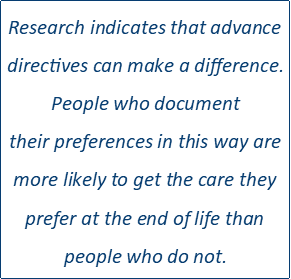 An advance directive is a general term used to describe your verbal and/ or written wishes regarding your medical care in the future. You might think of it as a living document—one that you can adjust as your situation changes because of new information or a change in your health.
An advance directive is a general term used to describe your verbal and/ or written wishes regarding your medical care in the future. You might think of it as a living document—one that you can adjust as your situation changes because of new information or a change in your health.
There are two types of advanced directives pertaining to healthcare:
1. Durable Medical Power of Attorney
This is a legal document that names a specific person who will make medical decisions for you at times when you are unable. This person should be familiar with your values and wishes. The person you name may be a spouse, other family member, friend, or member of a faith community. You may also choose one or more alternates in case the person you chose is unable to fulfill the role.
Visit Iowa Bar Association: Medical Power of Attorney
2. Living Will
This is a written document that helps you tell your doctors what treatment you would like to receive if you are unable to make decisions yourself. This legal document spells out medical treatments you would and would not want to be used to keep you alive, as well as your preferences for other medical decisions, such as pain management or organ donation.
Visit Iowa Bar Association: Living Wills
Iowa Physicians Order for Scope of Treatment (IPOST)
An IPOST turns your verbal and/ or written wishes regarding your medical care into medical orders. The IPOST form is a medical order meant for:
- The frail and elderly
- Adults and chidren with serious or terminal illnesses
- Adults and children with chronic, critical medical conditons
Visit the IPOST website
For more information about advance directives, please contact St. Anthony Social Services.